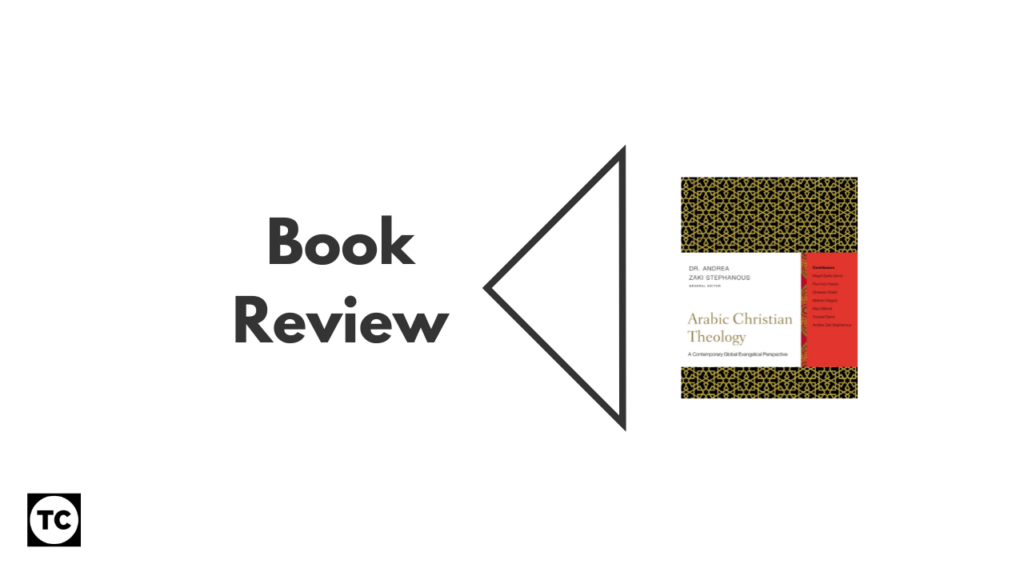
I’m a big fan of multi-contributor books – gettting different angles on important issues, or different facets of the same issue, is a valuable thing. So it was with high hopes that I approached the book I’m reviewing today, Arabic Christian Theology: A Contemporary Global Evangelical Perspective, published by Zondervan and edited by Dr. Andrea Zaki Stephanous. This is a wide ranging book, covering a range of topics, all engaed with by Arabic Christians from a range of backgrounds. It is potentially a useful tool for preachers and researchers looking to integrate ‘Arabic Christian Theology’ into their work – though it is also imperfect, as I’ll go on to explain. That said, the topics are definitely worth noting:
- 1. Arab Christians and the Old Testament (Magdi Sadiq Gendi)
- 2. The Concept of the Covenant in Evangelical Thought and Its Impact on the Middle East and North Africa: A Historical, Biblical, Theological and Ethical Study (Riad Aziz Kassis)
- 3. Jesus and Judaism: His Identity and Relationship to Judaism (Ghassan Kalaf)
- 4. Religion and Politics: Ancient Prophecies and Contemporary Policies (Makram Naguib)
- 5. The Christian Woman (Mary Mikhael)
- 6. The Cross andthe Power Issue: A Middle Eastern View (Youssef Samir)
- 7. Culture and Identity (Andrea Zaki Stephanous)
The volume also includes a useful Scripture Index and Subject Index.
Gendi’s opening chapter, ‘Arab Christians and the Old Testament’ is interesting but could easily be about western evangelicalism – in terms of thinking about rejecting the Old Testament and a chronic misunderstanding of it. A helpful essay. Somewhat frustratnigly, Gendi draws on primarily Western thinkers and scholars – making this more ‘Arabic Christian reflection on Western theology’ than ‘Arabic Christian Theology. The essay is helpful on the goodness of creation and the biblical theme of the people of God. Kassis offers a helpful overview of covenant – though again he is mostly engaging with Western ideas. He then applies the theological principles to the Israel/Palestine question. I agree with his four challenges about thinking about that question (p. 84-6) even if I might be wary of some of his examples. A thought provoking chapter that I’ll need to return to. Khalaf’s ‘Jesus and Judaism’ chapter has some really helpful stuff – particularly on recent attempts to ignore the Jewishness of Jesus. However at over 120 pages it could have been more concise, to say the least! More original work and a wider and less-Westernised bibliography than other chapters in this collection. Key takeaway is the emphasis on “Jesus’ dual identity: an individual and the embodiment of Israel, the people of God“.
In my view Naguib’s chapter on ‘religion and politics’, not least it’s inclusion of the Israel/Palestine question, is mixed. Kassis’ contribution is probably more useful on this contentious question. Overall, this is an essay/chapter with some gold, some dross, it could have been shorter and rather more firmly edited. Mikhael’s essay ‘The Christian Woman’ is a mixed bag. There is a definite service to the global church in her comparison of Islamic, Jewish, cultural and biblical views of women – though the essay doesn’t make a strong case for its seeming egalitarian thrust. Quite sparse and light referencing, among other issues, make this a tricky one to recommend. Samir’s ‘The Cross and the Power Issue’ is a frustrating essay – strong topic, some good biblical and cultural work, but some fluffy writing and typos made it tricky to read. Some useful insights for thinking about power, but for most folk I think it would be better to read Honeysett’s ‘Powerful Leaders’ or Harmon’s NSBT volume on the servant theme in Biblical Theology. Stephanous- the volume editor – pens a fascinating essay that closes out the volume, on ‘Culture and Identity’, considering Arabism/Islam, mutable and immutable identities, and other issues. This could definitely be a useful resource for thinking about nationalism(s), loyalty, and eschatology particularly for persecuted minorities
Overall, though, this is a mixed volume. A lot of promise and some fascinating topics are somewhat let down by over-long chapters, some poor editing (At different levels) and a sobering reliance on Western scholarship. ‘Arabic Christian Theology’ will remain in my library – and I’ll likely refer to it – but our brothers and sisters in this context surely have more to say. 3/5
Leave a Reply